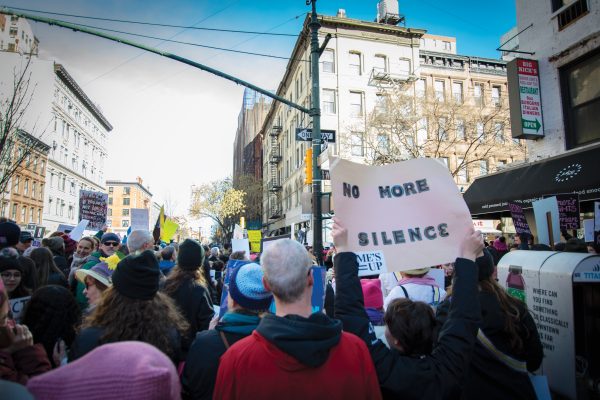All That Glitters is Not Golden
January 25, 2018
On Jan. 7, 2018, a night dedicated to women and perseverance in the face of sexual misconduct, Hollywood still managed to highlight its ignorance and traditional approach to handling changing cultural ideas by attempting to offend the least amount of people possible. Though there were moments of rebellion, the 75th Annual Golden Globes ceremony mostly consisted of empty remarks regarding the sweeping public ousting of improper sexual conduct and the impact of these actions on women.
That’s not to say there weren’t incredibly raw and impactful moments in what would inevitably be a highly politicized event. The red carpet blackout filled with women in black gowns and men donning “Time’s Up” pins was a sign of widespread solidarity among a population highly affected by toxic sexual behaviors. While some have argued that this highly enfranchised group failed to adequately respond to the root of the worldwide problem, the motion to wear black represented that sexual misconduct could no longer be ignored.
Especially following a year littered with protests that utilized clothing to express anger and displeasure with the status quo (the pink knit beanies from the Women’s March, shirts donning the popular ’70s lesbian separatist phrase, “The future is female,” etc.), the unanimous decision to wear all black allowed serious engagement and discussion with the matter at hand. Between the “zing” of Natalie Portman’s comment regarding male directors, the biting comedy in Seth Meyers’ opening monologue, and the brilliance and eloquence of Oprah’s acceptance speech of the Cecil B. Demille award, the Golden Globes managed to express the obvious sentiment of the atrociousness and unacceptability of sexual harassment and abuse both past and present.
That being said, Hollywood certainly tiptoed across a minefield of hypocrisy. In a night dedicated to female empowerment and working toward ending misogyny once and for all, no female directors were nominated for Best Motion Picture—Drama or Best Director. Awards were distributed to female-centered films and television series with themes of discovery and/or rebellion (i.e. “Lady Bird,” “The Marvelous Mrs. Maisel” and “The Handmaid’s Tale”) during an evening with an ongoing discussion condemning the inappropriate behaviors of many high-profile men, yet two men recently accused of sexual harassment and assault—James Franco and Aziz Ansari—were awarded for their work (albeit, these accusations were revealed in light of their wins). Not to mention the controversy surrounding the reshoots of “All the Money in the World,” which initially made headlines for cutting the defamed Kevin Spacey from the film and still making its holiday release, because Mark Wahlberg was paid one thousand times the salary of his female co-star, Michelle Williams.
Hollywood is clearly continuing its tradition of performative allyship—only making surface-level changes in efforts to gain public favor that ultimately fail to live up to the duties of true allies. The Golden Globes were only able to succeed in making superficial statements—the all-black dress code, the jokes surrounding highly publicized condemnations of sexual misconduct, the slew of speeches dedicated to female empowerment. Yet the actions that contradict the clear political goal of the evening spoke far louder than those attempting to stimulate change, and reinforced the ignorance and inability of the Hollywood elite to completely understand the plight of millions of young girls and women in a man’s world.
The 2018 Golden Globe awards engaged in a constant call for “change”—so enact some. When the institution is the problem, they must learn to take responsibility for their actions and shortcomings and act toward legitimate social and political change. You cannot just deliver empty comments and expect for the problem to fix itself; if you genuinely want to end the injustices you preach against, stop neglecting the talents of female actors/crews/producers/directors, pay people the same regardless of gender and stop rewarding the toxic masculinity that has created this power paradigm to begin with. You cannot devoutly preach that “time’s up” and expect to change lives for the better overnight. The fact of the matter is time has been up for a long time, and Hollywood needs to do more than sell pins and wait for Oprah to save the day.











